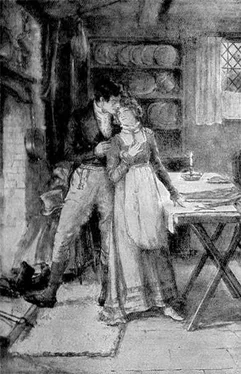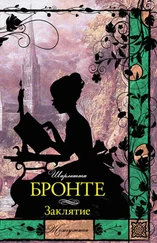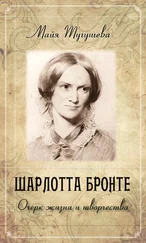But Shirley was cool and lofty no longer, at least not at this moment. She appeared unconscious of the humility of her present position; or if conscious, it was only to taste a charm in its lowliness. It did not revolt her pride that the group to whom she voluntarily officiated as handmaid should include her cousin's tutor. It did not scare her that while she handed the bread and milk to the rest, she had to offer it to him also; and Moore took his portion from her hand as calmly as if he had been her equal.
"You are overheated now," he said, when she had retained the fork for some time; "let me relieve you."
And he took it from her with a sort of quiet authority, to which she submitted passively, neither resisting him nor thanking him.
"I should like to see your pictures, Louis," said Caroline, when the sumptuous luncheon was discussed.—"Would not you, Mr. Hall?"
"To please you, I should; but, for my own part, I have cut him as an artist. I had enough of him in that capacity in Cumberland and Westmoreland. Many a wetting we got amongst the mountains because he would persist in sitting on a camp–stool, catching effects of rain–clouds, gathering mists, fitful sunbeams, and what not."
"Here is the portfolio," said Henry, bringing it in one hand and leaning on his crutch with the other.
Louis took it, but he still sat as if he wanted another to speak. It seemed as if he would not open it unless the proud Shirley deigned to show herself interested in the exhibition.
"He makes us wait to whet our curiosity," she said.
"You understand opening it," observed Louis, giving her the key. "You spoiled the lock for me once; try now."
He held it. She opened it, and, monopolizing the contents, had the first view of every sketch herself. She enjoyed the treat—if treat it were—in silence, without a single comment. Moore stood behind her chair and looked over her shoulder, and when she had done and the others were still gazing, he left his post and paced through the room.
A carriage was heard in the lane—the gate–bell rang. Shirley started.
"There are callers," she said, "and I shall be summoned to the room. A pretty figure—as they say—I am to receive company. I and Henry have been in the garden gathering fruit half the morning. Oh for rest under my own vine and my own fig–tree! Happy is the slave–wife of the Indian chief, in that she has no drawing–room duty to perform, but can sit at ease weaving mats, and stringing beads, and peacefully flattening her pickaninny's head in an unmolested corner of her wigwam. I'll emigrate to the western woods."
Louis Moore laughed.
"To marry a White Cloud or a Big Buffalo, and after wedlock to devote yourself to the tender task of digging your lord's maize–field while he smokes his pipe or drinks fire–water."
Shirley seemed about to reply, but here the schoolroom door unclosed, admitting Mr. Sympson. That personage stood aghast when he saw the group around the fire.
"I thought you alone, Miss Keeldar," he said. "I find quite a party."
And evidently from his shocked, scandalized air, had he not recognized in one of the party a clergyman, he would have delivered an extempore philippic on the extraordinary habits of his niece: respect for the cloth arrested him.
"I merely wished to announce," he proceeded coldly, "that the family from De Walden Hall, Mr., Mrs., the Misses, and Mr. Sam Wynne, are in the drawing–room." And he bowed and withdrew.
"The family from De Walden Hall! Couldn't be a worse set," murmured Shirley.
She sat still, looking a little contumacious, and very much indisposed to stir. She was flushed with the fire. Her dark hair had been more than once dishevelled by the morning wind that day. Her attire was a light, neatly fitting, but amply flowing dress of muslin; the shawl she had worn in the garden was still draped in a careless fold round her. Indolent, wilful, picturesque, and singularly pretty was her aspect—prettier than usual, as if some soft inward emotion, stirred who knows how, had given new bloom and expression to her features.
"Shirley, Shirley, you ought to go," whispered Caroline.
"I wonder why?"
She lifted her eyes, and saw in the glass over the fireplace both Mr. Hall and Louis Moore gazing at her gravely.
"If," she said, with a yielding smile—"if a majority of the present company maintain that the De Walden Hall people have claims on my civility, I will subdue my inclinations to my duty. Let those who think I ought to go hold up their hands."
Again consulting the mirror, it reflected an unanimous vote against her.
"You must go," said Mr. Hall, "and behave courteously too. You owe many duties to society. It is not permitted you to please only yourself."
Louis Moore assented with a low "Hear, hear!"
Caroline, approaching her, smoothed her wavy curls, gave to her attire a less artistic and more domestic grace, and Shirley was put out of the room, protesting still, by a pouting lip, against her dismissal.
"There is a curious charm about her," observed Mr. Hall, when she was gone. "And now," he added, "I must away; for Sweeting is off to see his mother, and there are two funerals."
"Henry, get your books; it is lesson–time," said Moore, sitting down to his desk.
"A curious charm!" repeated the pupil, when he and his master were left alone. "True. Is she not a kind of white witch?" he asked.
"Of whom are you speaking, sir?"
"Of my cousin Shirley."
"No irrelevant questions; study in silence."
Mr. Moore looked and spoke sternly—sourly. Henry knew this mood. It was a rare one with his tutor; but when it came he had an awe of it. He obeyed.
Chapter XXVII
The First Bluestocking
Miss Keeldar and her uncle had characters that would not harmonize, that never had harmonized. He was irritable, and she was spirited. He was despotic, and she liked freedom. He was worldly, and she, perhaps, romantic.
Not without purpose had he come down to Yorkshire. His mission was clear, and he intended to discharge it conscientiously. He anxiously desired to have his niece married, to make for her a suitable match, give her in charge to a proper husband, and wash his hands of her for ever.
The misfortune was, from infancy upwards, Shirley and he had disagreed on the meaning of the words "suitable" and "proper." She never yet had accepted his definition; and it was doubtful whether, in the most important step of her life, she would consent to accept it.
The trial soon came.
Mr. Wynne proposed in form for his son, Samuel Fawthrop Wynne.
"Decidedly suitable! most proper!" pronounced Mr. Sympson. "A fine unencumbered estate, real substance, good connections. It must be done! "
He sent for his niece to the oak parlour; he shut himself up there with her alone; he communicated the offer; he gave his opinion; he claimed her consent.
It was withheld.
"No; I shall not marry Samuel Fawthrop Wynne."
"I ask why. I must have a reason. In all respects he is more than worthy of you."
She stood on the hearth. She was pale as the white marble slab and cornice behind her; her eyes flashed large, dilated, unsmiling.
"And I ask in what sense that young man is worthy of me ?"
"He has twice your money, twice your common sense, equal connections, equal respectability."
"Had he my money counted fivescore times I would take no vow to love him."
"Please to state your objections."
"He has run a course of despicable, commonplace profligacy. Accept that as the first reason why I spurn him."
"Miss Keeldar, you shock me!"
"That conduct alone sinks him in a gulf of immeasurable inferiority. His intellect reaches no standard I can esteem: there is a second stumbling–block. His views are narrow, his feelings are blunt, his tastes are coarse, his manners vulgar."
Читать дальше











